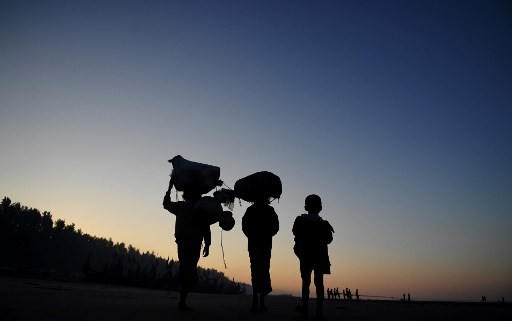Popular Reads
Top Results
Can't find what you're looking for?
View all search resultsPopular Reads
Top Results
Can't find what you're looking for?
View all search resultsExperts not optimistic about Rohingya repatriation deal
Bangladesh may have fallen into Myanmar’s trap by signing agreement, say analysts
Change text size
Gift Premium Articles
to Anyone
F
oreign relations experts say they are not optimistic about the deal signed between Bangladesh and Myanmar for return of Rohingya refugees, as the bilateral instrument sets no timeframe for completing repatriation and fails to mention the UN’s role in the process.
Referring to the previous experiences of Rohingya repatriation, they said Myanmar had always employed delaying tactics and acted on its own agenda, despite efforts from Bangladesh.
“Bangladesh may have fallen into the trap of Myanmar’s tactic by signing the deal,” said Professor CR Abrar, who teaches international relations at Dhaka University.
Myanmar’s early signing of the deal is meant to defuse the international pressure mounted on it stemming from atrocities committed by Myanmar’s security forces which have forced over 620,000 Rohingya to flee to Bangladesh since Aug. 25.
The United Nations and United States have both termed the actions “ethnic cleansing”, while rights bodies define them “crimes against humanity” and “genocide”.
The UN has also adopted a resolution urging Myanmar to grant citizenship to the Rohingya, accept their return and halt the atrocities in Rakhine. The Muslim Rohingya have been denied citizenship and its attendant rights in Buddhist-majority Myanmar despite having lived there for generations.
“It is very likely that Myanmar will arbitrarily decide … who is to be repatriated and who is not if the UN is not involved,” said Abrar, also executive director at the Refugee and Migratory Movements Research Unit.
Myanmar will take back a token number of refugees, as happened before, he said.
Around 250,000 Rohingya fled persecution in Myanmar in 1978. Almost all were sent back by agreement, but another 250,000 Rohingya re-entered Bangladesh in 1991-92.
Between 1992 and 2005, a total of 236,000 Rohingya were repatriated under an open-ended 1992 Myanmar-Bangladesh bilateral agreement. Since 2005, not a single Rohingya has been repatriated despite numerous efforts by Bangladesh.
Meanwhile, 300,000 additional Rohingya fled to Bangladesh between 2012 and 2016. With the new arrivals, about 900,000 Rohingyas are now living in Bangladesh, mainly in refugee camps, putting the country under tremendous pressure.
Abrar said if Myanmar is sincere about taking back the Rohingya, they should have prepared detailed terms by this time.
Humayun Kabir, former Bangladeshi ambassador to the US, said, “When the deal is open-ended, we become concerned over the fate of repatriation, because our experience in the past is not a happy one.”
Moreover, the evidence present in Rakhine on persecution of the Rohingya is even more concerning as Myanmar authorities have not been able to restore the law and order in the Rakhine state, he said.
Kabir said no mention of UN involvement in the repatriation process is totally unexpected.
He said the most important thing for repatriation of the Rohingya is creating a favorable environment in Rakhine, but such an effort is yet to be seen.
On verification of the Rohingyas, he said it is clear they had fled to Bangladesh, which the Myanmar authorities had already acknowledged. Bangladesh authorities had also biometrically registered them all, and that should be one basis of repatriation, Kabir said.
Imtiaz Ahmed, professor of international relations at Dhaka University, said the major issue in repatriation is whether the Rohingya are issued citizenship. If that guarantee is not there, repatriation would be a difficult job, he added.
“I don’t know the details of the arrangement signed, but Bangladesh must have addressed the citizenship issue,” Imtiaz said.
He thinks the bilateral deal between Bangladesh and Myanmar does not mean that international pressure has stopped. Both the UN and the US have identified the violence in Rakhine ethnic cleansing.
Therefore, Imtiaz said, the issue has to be dealt with legally on an international level.










